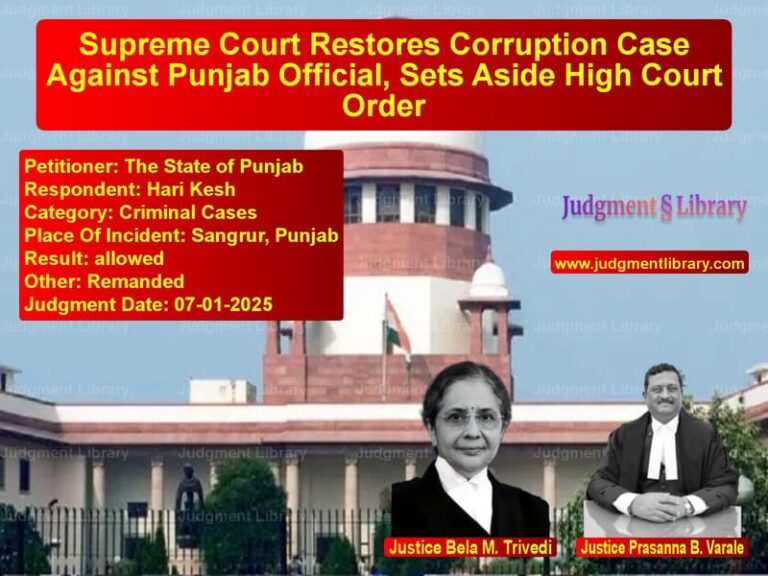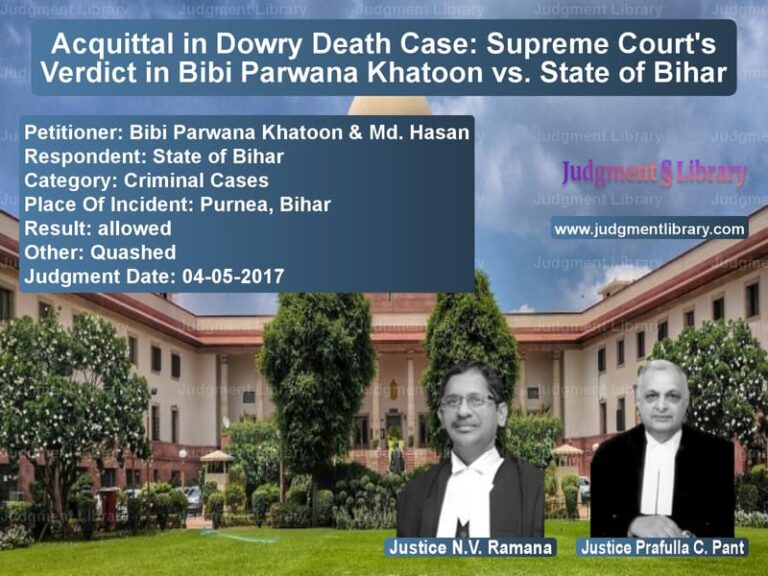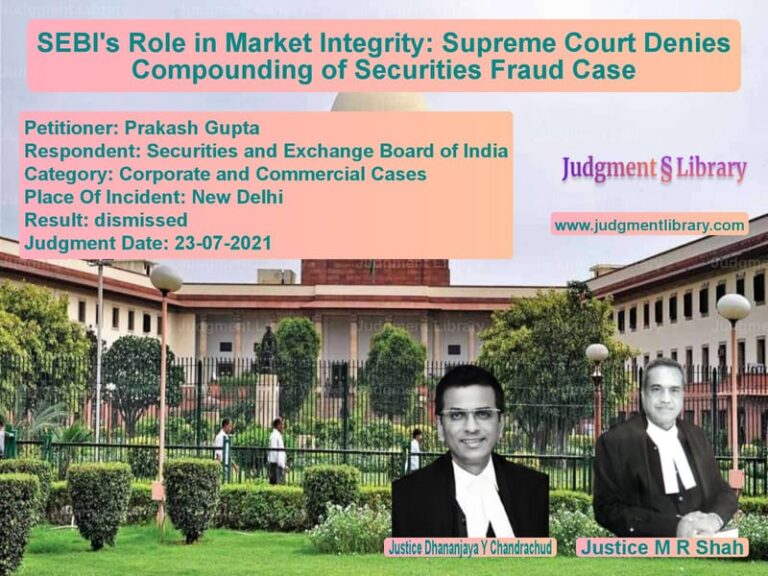Supreme Court Rules on Insolvency Proceedings Against Transmission Corporation of Andhra Pradesh
The Supreme Court of India recently delivered a landmark ruling in the case of Transmission Corporation of Andhra Pradesh Limited vs. Equipment Conductors and Cables Limited, addressing a crucial question of whether a time-barred claim, previously rejected in arbitration, could be revived under insolvency proceedings. The decision reinforces the principle that the Insolvency and Bankruptcy Code (IBC), 2016, cannot be used as a mere debt recovery mechanism but should serve its primary purpose of resolving genuine insolvencies.
Background of the Case
The case originated from a contractual dispute between the appellant, Transmission Corporation of Andhra Pradesh Limited (APTRANSCO), a government-owned entity, and the respondent, Equipment Conductors and Cables Limited, a supplier of electrical conductors and related equipment. The dispute arose over unpaid invoices related to the supply of goods, leading to arbitration and subsequent legal proceedings.
The respondent initially sought arbitration before the Haryana Micro and Small Enterprises Facilitation Council, where claims under certain invoices (1-57) were deemed time-barred, while claims under invoices 58-82 were allowed. However, dissatisfied with the arbitral ruling, the respondent proceeded to file an application under Section 9 of the IBC before the National Company Law Tribunal (NCLT), Hyderabad, seeking initiation of insolvency proceedings against APTRANSCO.
Legal Issues Before the Supreme Court
- Whether a claim previously held to be time-barred in arbitration could be revived under the IBC.
- Whether an operational debt existed that could justify the initiation of insolvency proceedings.
- Whether the NCLAT erred in directing settlement of a disputed claim.
- The extent to which government undertakings like APTRANSCO could be subjected to insolvency proceedings.
Arguments by the Petitioner (APTRANSCO)
The appellant, APTRANSCO, made the following key arguments:
- The claims under invoices 1-57 had already been rejected in arbitration and, therefore, could not be revived under insolvency proceedings.
- The NCLT correctly dismissed the insolvency application as there was no valid and enforceable operational debt.
- The IBC is intended for resolving insolvencies, not for the enforcement of disputed claims or recovering debts.
- The NCLAT erred in directing the settlement of a claim that was not legally tenable.
- Allowing such claims would open the floodgates for misuse of the insolvency framework by creditors attempting to recover otherwise unenforceable debts.
Arguments by the Respondent (Equipment Conductors and Cables Limited)
The respondent countered these arguments with the following contentions:
- The claims, though previously rejected in arbitration, should be considered under IBC as APTRANSCO remained in default.
- The NCLAT rightly directed the appellant to settle the claim, recognizing the financial distress caused to the respondent.
- The objective of the IBC is to ensure financial discipline, and therefore, operational creditors should be allowed to use the framework for enforcement.
- The arbitration award did not preclude the respondent from seeking insolvency proceedings.
Supreme Court’s Observations
The Supreme Court extensively analyzed the case, making the following crucial observations:
- “The IBC is not intended to be used as an alternative recovery mechanism for time-barred claims.”
- “Since the arbitral tribunal ruled against claims under invoices 1-57, those claims cannot be considered as an operational debt under the IBC.”
- “The existence of a ‘real dispute’ negates the very foundation of insolvency proceedings.”
- “The NCLAT erred in directing the settlement of a claim without legal enforceability.”
- “Time-barred claims should not be resurrected under the insolvency framework as it would undermine commercial certainty.”
Final Judgment
Based on these findings, the Supreme Court ruled in favor of APTRANSCO, setting aside the NCLAT order and dismissing the insolvency proceedings initiated by the respondent.
- The Supreme Court categorically held that time-barred claims are not admissible under the IBC framework.
- It reinforced that the insolvency process cannot be weaponized by creditors to bypass limitations imposed by other legal mechanisms.
- Government undertakings such as APTRANSCO cannot be subjected to insolvency proceedings based on disputed and unenforceable claims.
Implications of the Judgment
The ruling carries significant implications for insolvency law and corporate debt resolution in India:
- Clarification on the Use of IBC: The judgment reaffirms that the IBC is not a debt recovery tool but a framework for genuine insolvency resolution.
- Finality of Arbitration Awards: Creditors cannot use insolvency proceedings to revive claims that have already been ruled time-barred.
- Protection for Government Entities: The ruling shields public sector enterprises from unnecessary insolvency proceedings based on disputed claims.
- Judicial Discipline: The decision sets a strong precedent ensuring that courts and tribunals adhere strictly to the legislative intent of the IBC.
Conclusion
The Supreme Court’s ruling in Transmission Corporation of Andhra Pradesh Limited vs. Equipment Conductors and Cables Limited establishes a crucial precedent in insolvency law. It reinforces the idea that insolvency mechanisms should not be misused for enforcing time-barred claims. By rejecting the NCLAT’s approach, the judgment upholds legal certainty, ensures adherence to the IBC’s objectives, and provides a safeguard for government undertakings against frivolous insolvency proceedings.
Petitioner Name: Transmission Corporation of Andhra Pradesh Limited.Respondent Name: Equipment Conductors and Cables Limited.Judgment By: Justice A.K. Sikri, Justice Ashok Bhushan.Place Of Incident: Andhra Pradesh.Judgment Date: 23-10-2018.
Don’t miss out on the full details! Download the complete judgment in PDF format below and gain valuable insights instantly!
Download Judgment: Transmission Corpora vs Equipment Conductors Supreme Court of India Judgment Dated 23-10-2018.pdf
Direct Downlaod Judgment: Direct downlaod this Judgment
See all petitions in Arbitration Awards
See all petitions in Enforcement of Awards
See all petitions in Dispute Resolution Mechanisms
See all petitions in Judgment by A.K. Sikri
See all petitions in Judgment by Ashok Bhushan
See all petitions in allowed
See all petitions in supreme court of India judgments October 2018
See all petitions in 2018 judgments
See all posts in Arbitration and Alternate Dispute Resolution Category
See all allowed petitions in Arbitration and Alternate Dispute Resolution Category
See all Dismissed petitions in Arbitration and Alternate Dispute Resolution Category
See all partially allowed petitions in Arbitration and Alternate Dispute Resolution Category







